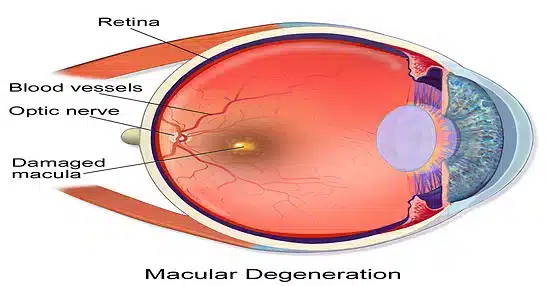Macular Degeneration Medication: What are the Available Options?
Macular Degeneration is a common eye disorder affecting around 11 million people in the US.
It can be of two types, dry and wet Macular Degeneration.
Treatments for the eye disorder depend on its stage and type.
The current treatment management strategies for dry Macular Degeneration involve vitamins and supplements.
For wet Macular Degeneration, doctors prescribe anti-VEGF injections.
Here, the article discusses Macular degeneration medication and newly developed treatments.
Anti-VEGF Drugs

Wet Age-related Macular Degeneration (AMD) is caused due to growth of abnormal blood vessels.
These blood vessels leak fluid or blood into the macula, causing blurring vision.
The abnormal growth of blood vessels results from the overproduction of a protein called the Vascular Endothelial Growth Factor (VEGF).
The protein also increases the permeability of existing blood vessels and causes them to leak.
The anti-VEGF medicines bind to VEGF receptors and restrict protein production.
This eventually prevents the growth of blood vessels and treats the symptoms of wet AMD.
Commonly prescribed anti-VEGF injections for Macular Degeneration include,
Bevacizumab
Bevacizumab is prescribed for treating age-related Macular Degeneration and diabetes-related eye disorders.
Bevacizumab is available under the brand name Avastin and is commonly prescribed by doctors under off-label use.
It is an anti-VEGF drug that blocks the growth of VEGF chemicals in the body.
The medicine eventually helps slow the growth of blood vessels in the eye and prevent fluid leaks.
Bevacizumab is used as an injection.
It might show some side effects, which include,
- Eye redness
- Grittiness
- Dry eyes
- Temporary blurry vision
- Floaters
Ranibizumab-Nuna
Ranibizumab-Nuna is an FDA-approved medicine that slows vision loss in patients with wet Macular Degeneration.
It is also prescribed for those who suffer from a diabetic eye disorder, Retinal vein occlusion, or Histoplasmosis.
Like Bevacizumab, Ranibizumab also blocks the development of VEGF.
It further restricts the growth of blood vessels and the leak of fluid.
Ranibizumab is available under the brand of Byooviz and is a biosimilar drug to commonly prescribed Lucentis.
It is injected into the eye and can show the following side effects,
- Photosensitivity
- Eye pain
- Ocular redness
- Dry eyes
- Itchiness and irritation in the eyes
- Swelling
Aflibercept

Aflibercept is an FDA-approved medicine injected into the eye to treat AMD.
It works like other anti-VEGF medications and prevents the production of VEGF chemicals.
The medicine slows vision loss by blocking the growth of blood vessels and their leak.
Aflibercept is also available under the brand Eylea.
It can show the following side effects:
- Eye pain
- Ocular redness
- Eye floaters
- Cataracts
- Vitreous detachment
- Swelling of eyelid
- Watery eyes
Brolucizumab
Brolucizumab is an anti-VEGF macular degeneration medicine approved by FDA in 2019.
It treats wet age-related Macular Degeneration, diabetic eye disorder, and Macular edema.
Brolucizumab is also available under the brand name Beovu.
It controls the symptoms of wet AMD by stopping abnormal blood vessel growth and leakage in the eyes that may cause vision loss.
Some of the side effects of Brolucizumab are,
- Eye pain
- Changes in vision
- Bleeding around the eye
- Eyelid swelling
- Itching and redness in the eye
New age medication for Macular Degeneration
The ongoing study of effective medications for Age-related Macular Degeneration has shown new developments recently.
The previous medications for wet Macular Degeneration were effective but required monthly eyeshots.
Hence, recent research is around extending the period between two doses of medication.
The FDA approved Vabysmo in January 2022 for treating wet AMD.
It contains the active ingredient Faricimab which works similarly to other anti-VEGF injections.
Faricimab is also injected into the eye, but it often lasts longer than earlier anti-VEGF drugs.
Studies have shown that patients can go at least three months between treatments, while more than 50% of them could even go up to 4 months.
The medicine can cause side effects that include,
- Eye irritation
- Floaters
- Photosensitivity
- Vision changes
Also Read: You can go through the article, Eye Vitamins for Macular Degeneration: Know the Right Combination.
Conclusion
Macular Degeneration is a common condition that can lead to complete vision loss if ignored.
Its medications primarily include anti-VEGF injections that treat the symptoms of wet AMD in patients.
These injections are prescribed according to the severity of the condition and age of the patient.
Hence, consult an ophthalmologist immediately if you are experiencing the symptoms of wet Macular Degeneration.
An early diagnosis and treatment can save you from complete blindness.
Frequently Asked Questions
WowRx uses only high-quality sources while writing our articles. Please read our content information policy to know more about how we keep our content reliable and trustworthy.






